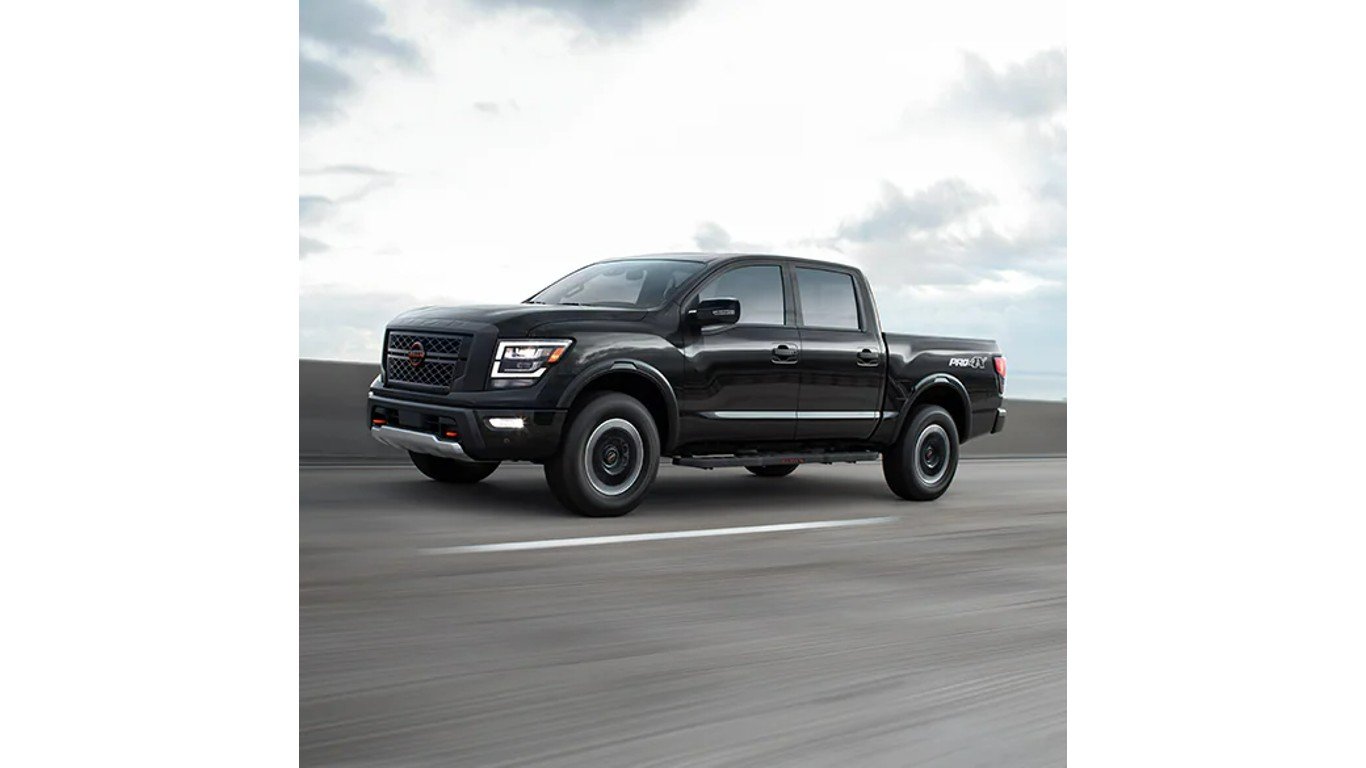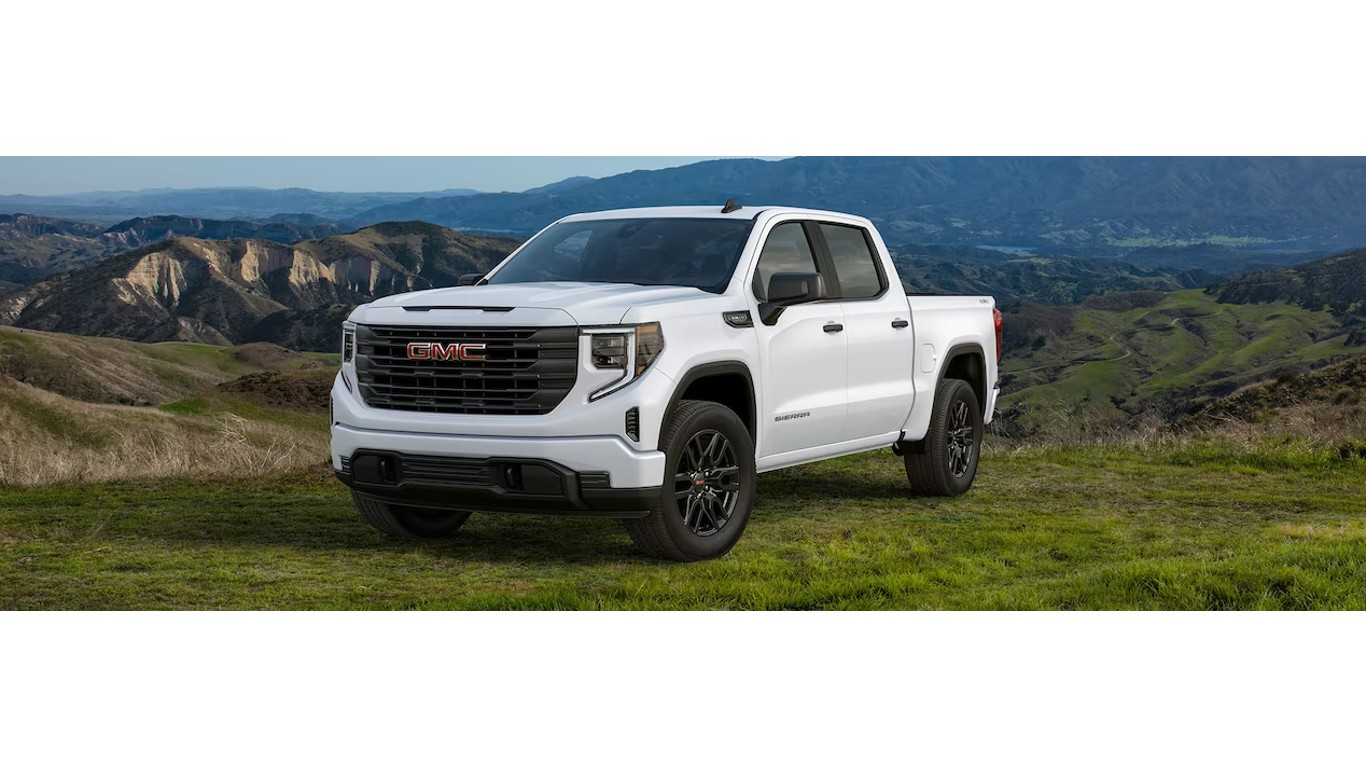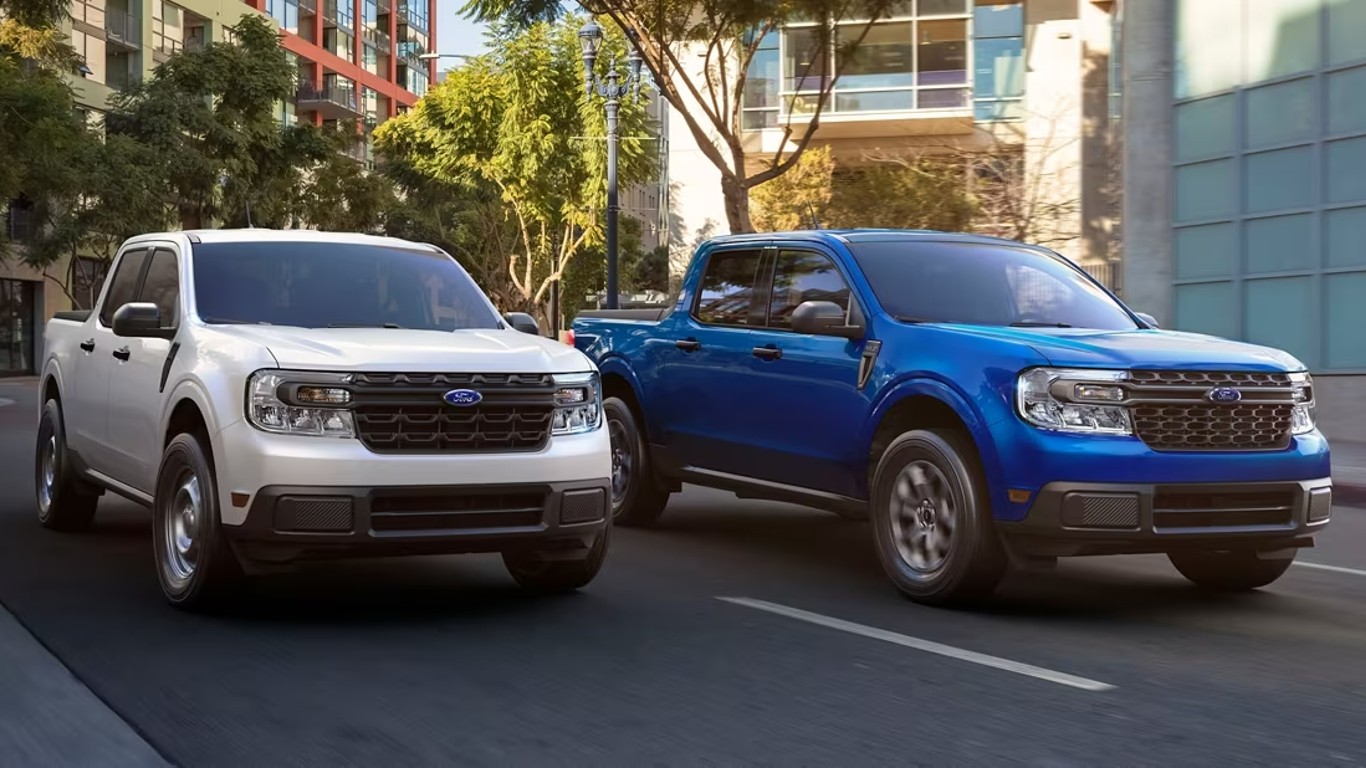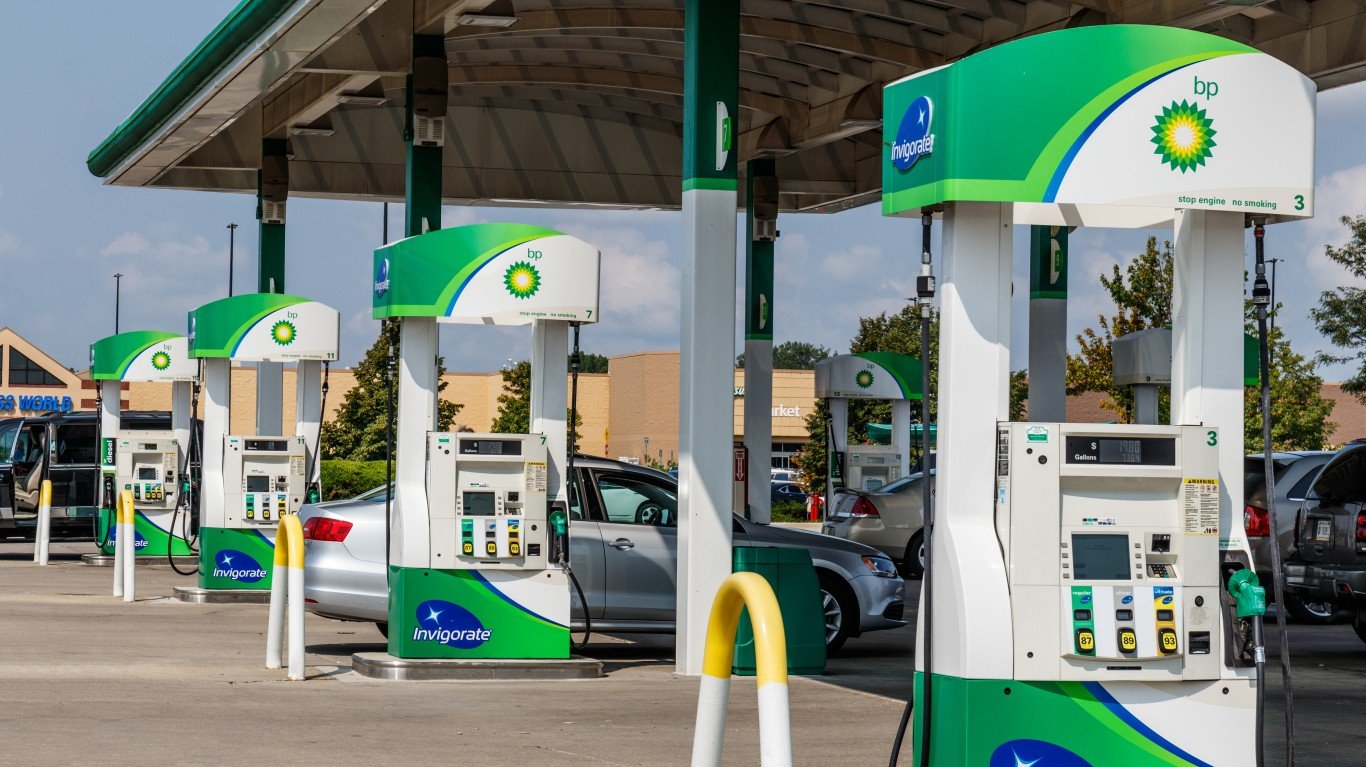

As part of a broader effort to address the climate crisis, the Biden administration is using tax credits and direct government investment to boost electric vehicle sales, expand EV charging infrastructure, and encourage domestic EV manufacturing. The administration’s goal is to have EVs account for half of all new vehicle sales in the U.S. by 2030.
The transition to EVs will not only reduce American carbon emissions, but it will also make driving considerably less expensive. According to estimates from the Department of Energy, mile for mile, EVs cost about half as much to drive as gasoline powered vehicles. And Americans who drive vehicles with poor fuel economy may stand to save the most.
Among all consumer vehicle segments, pickup trucks are by far the least fuel efficient. Pickups in the 2022 model year get an average of just 20 miles per gallon, according to estimates from the Environmental Protection Agency – about 5 MPG less than the average across truck-based SUVs.
So far, EV options for those who are unwilling or unable to sacrifice the utility of a pickup are limited to only a few models – including the Rivian R1T and GMC Hummer, which start at over $70,000 for the base models. While EV sticker prices may be prohibitively high for most new truck buyers, some gas-powered pickups available today offer far better bang for the buck at the pump than others. (Here is a look at the states with the highest and lowest gas taxes.)
Using EPA and Department of Energy data from fueleconomy.gov, 24/7 Wall St. identified the most fuel efficient pickup trucks on the market. We reviewed nearly 180 available pickup truck configurations and ranked each nameplate by its most fuel efficient build, as measured by the estimated combined MPG. We reviewed data from both the 2024 and 2023 model years and ranked the most recent available year. EVs, plug-in hybrids, and diesel vehicles were excluded from analysis.
For any vehicle, fuel efficiency is subject to a number of factors. Some of them are contingent on driving habits, but those related directly to the vehicle itself include weight, ground clearance, aerodynamics, drivetrain, and engine size.
Among the 15 pickup truck nameplates on this list, average combined fuel efficiency ranges from as low as 17 MPG up to 37 MPG. Many of the least efficient vehicles on this list are full-size trucks with larger engines, while some of the most efficient are classified as small trucks and tend to have smaller engines. Each of the top two trucks on this list has a hybrid engine.
It is important to note that the MPG ratings used to rank these vehicles are based on the most fuel efficient configuration available, and that many of these trucks are also available with far worse gas mileage. The Ford F150, for example, ranks high on this list with rear-wheel drive, a 3.5 liter, 6 cylinder engine, and a 25 MPG combined rating. However, the F-150 is also available in four-wheel drive with a 5.2 liter, 8 cylinder engine – a configuration that gets a combined 12 MPG. (Here is a look at the best selling vehicles in America.)
Here are the most fuel efficient pickup trucks.

15. Nissan Titan
> Best available efficiency (MPG): 17 combined; 15 city; 21 highway
> Most fuel-efficient engine size: 8 cylinder; 5.6 liter displacement
> Most fuel-efficient drive-train: 2-wheel drive, rear
> Est. fuel costs: $3,800 per year; $9,250 more than avg. over 5-years
> Model year considered: 2024
> Est. base MSRP: $47,665
[in-text-ad]

14. Jeep Gladiator
> Best available efficiency (MPG): 19 combined; 17/16 city; 22/23 highway
> Most fuel-efficient engine size: 6 cylinder; 3.6 liter displacement
> Most fuel-efficient drive-train: 4-wheel drive
> Est. fuel costs: $2,350 per year; $3,750 more than avg. over 5-years
> Model year considered: 2023
> Est. base MSRP: $40,785

13. GMC Canyon
> Best available efficiency (MPG): 19 combined; 18 city; 22 highway
> Most fuel-efficient engine size: 4 cylinder; 2.7 liter displacement
> Most fuel-efficient drive-train: 4-wheel drive
> Est. fuel costs: $2,850 per year; $4,500 more than avg. over 5-years
> Model year considered: 2024
> Est. base MSRP: $39,000

12. Chevrolet Colorado
> Best available efficiency (MPG): 20 combined; 18 city; 23 highway
> Most fuel-efficient engine size: 4 cylinder; 2.7 liter displacement
> Most fuel-efficient drive-train: 4-wheel drive
> Est. fuel costs: $2,700 per year; $3,750 more than avg. over 5-years
> Model year considered: 2024
> Est. base MSRP: $31,000

11. Chevrolet Silverado
> Best available efficiency (MPG): 20 combined; 18 city; 22 highway
> Most fuel-efficient engine size: 4 cylinder; 2.7 liter displacement
> Most fuel-efficient drive-train: 2-wheel drive, rear
> Est. fuel costs: $2,700 per year; $3,750 more than avg. over 5-years
> Model year considered: 2024
> Est. base MSRP: $37,445

10. GMC Sierra
> Best available efficiency (MPG): 20 combined; 18 city; 22 highway
> Most fuel-efficient engine size: 4 cylinder; 2.7 liter displacement
> Most fuel-efficient drive-train: 2-wheel drive, rear
> Est. fuel costs: $2,700 per year; $3,750 more than avg. over 5-years
> Model year considered: 2024
> Est. base MSRP: $38,345

9. Honda Ridgeline
> Best available efficiency (MPG): 21 combined; 18 city; 24 highway
> Most fuel-efficient engine size: 6 cylinder; 3.5 liter displacement
> Most fuel-efficient drive-train: all wheel drive
> Est. fuel costs: $2,100 per year; $2,500 more than avg. over 5-years
> Model year considered: 2023
> Est. base MSRP: $40,175

8. Nissan Frontier
> Best available efficiency (MPG): 21 combined; 18 city; 24 highway
> Most fuel-efficient engine size: 6 cylinder; 3.8 liter displacement
> Most fuel-efficient drive-train: 2-wheel drive, rear
> Est. fuel costs: $2,550 per year; $3,000 more than avg. over 5-years
> Model year considered: 2024
> Est. base MSRP: $31,105

7. Toyota Tacoma
> Best available efficiency (MPG): 21 combined; 19/20 city; 23/24 highway
> Most fuel-efficient engine size: 6 o6 4 cylinder; 3.5 or 2.7 liter displacement
> Most fuel-efficient drive-train: 2-wheel drive, rear
> Est. fuel costs: $2,100 per year; $2,500 more than avg. over 5-years
> Model year considered: 2023
> Est. base MSRP: $30,095

6. RAM 1500
> Best available efficiency (MPG): 22 combined; 20 city; 25 highway
> Most fuel-efficient engine size: 6 cylinder; 3.6 liter displacement
> Most fuel-efficient drive-train: 2-wheel drive, rear
> Est. fuel costs: $2,450 per year; $2,500 more than avg. over 5-years
> Model year considered: 2024
> Est. base MSRP: $39,900

5. Toyota Tundra
> Best available efficiency (MPG): 22 combined; 20 city; 24 highway
> Most fuel-efficient engine size: 6 cylinder; 3.4 liter displacement
> Most fuel-efficient drive-train: 2-wheel drive, rear
> Est. fuel costs: $2,450 per year; $2,500 more than avg. over 5-years
> Model year considered: 2024
> Est. base MSRP: $41,815

4. Ford Ranger
> Best available efficiency (MPG): 23 combined; 21 city; 26 highway
> Most fuel-efficient engine size: 4 cylinder; 2.3 liter displacement
> Most fuel-efficient drive-train: 2-wheel drive, rear
> Est. fuel costs: $1,900 per year; $1,500 more than avg. over 5-years
> Model year considered: 2023
> Est. base MSRP: $28,895

3. Hyundai Santa Cruz
> Best available efficiency (MPG): 23 combined; 22 city; 26 highway
> Most fuel-efficient engine size: 4 cylinder; 2.5 liter displacement
> Most fuel-efficient drive-train: 2-wheel drive, front
> Est. fuel costs: $2,350 per year; $2,000 more than avg. over 5-years
> Model year considered: 2024
> Est. base MSRP: $27,985

2. Ford F150 Pickup
> Best available efficiency (MPG): 25 combined; 25 city; 25 highway
> Most fuel-efficient engine size: Hybrid 6 cylinder; 3.5 liter displacement
> Most fuel-efficient drive-train: 2-wheel drive, rear
> Est. fuel costs: $1,750 per year; $750 more than avg. over 5-years
> Model year considered: 2023
> Est. base MSRP: $35.830
[in-text-ad-2]

1. Ford Maverick
> Best available efficiency (MPG): 37 combined; 40 city; 33 highway
> Most fuel-efficient engine size: Hybrid 4 cylinder; 2.5 liter displacement
> Most fuel-efficient drive-train: 2-wheel drive, front
> Est. fuel costs: $1,200 per year; $2,000 less than avg. over 5-years
> Model year considered: 2023
> Est. base MSRP: $24,170
Methodology:
To identify the most fuel efficient new trucks on the market, 24/7 Wall St. reviewed fuel efficiency data from fueleconomy.gov, a site run by the Environmental Protection Agency and the U.S. Department of Energy. We reviewed nearly 180 available pickup truck configurations and ranked each nameplate by their most fuel efficient build, as measured by EPA estimated combined MPG. EVs and plug-in hybrids, and diesel vehicles were excluded from analysis.
For new vehicles with release dates before Oct. 4, 2023, we used 2024 model years. All other pickups were ranked using data for the 2023 model year. Supplemental data on engine and drivetrain configuration and estimated fuel costs were also from fueleconomy.gov.
Estimated base price is from automotive industry publication, Car And Driver.
Smart Investors Are Quietly Loading Up on These “Dividend Legends”
If you want your portfolio to pay you cash like clockwork, it’s time to stop blindly following conventional wisdom like relying on Dividend Aristocrats. There’s a better option, and we want to show you. We’re offering a brand-new report on 2 stocks we believe offer the rare combination of a high dividend yield and significant stock appreciation upside. If you’re tired of feeling one step behind in this market, this free report is a must-read for you.
Click here to download your FREE copy of “2 Dividend Legends to Hold Forever” and start improving your portfolio today.
Thank you for reading! Have some feedback for us?
Contact the 24/7 Wall St. editorial team.
 24/7 Wall St.
24/7 Wall St. 24/7 Wall St.
24/7 Wall St.


